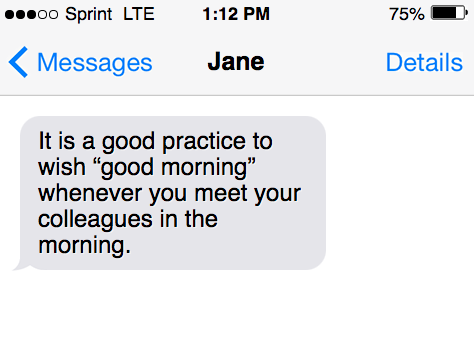Is the idiom “good morning” capitalized? When starting a sentence with the phrase, should it be in capital letters or lowercase letters? Learn the inner workings of this grammar question inside this English worksheet.
Is “good morning” capitalized?
Whether the phrase “good morning” should be capitalized or not depends on the way you want to use the phrase!
Incidentally, in Cheery (1959) by John Smiley, he happened to invent this phrase. The phrase was used for appreciating the workers’ efforts as they begin their daily activities.
Knowing where and when to capitalize this phrase may be a challenge for some people. Multiple mechanisms exist for the capitalization of “good morning.”
If you intend to use the phrase “good morning” to greet someone as a noun, you should not capitalize it. The phrase should only get capitalized if the word “good” starts the sentence.
Examples in sentences
- “Good Morning!” said the participants as they greeted their coach enthusiastically at the beginning of the session.
- It is a good practice to wish “good morning” whenever you meet your colleagues in the morning.
Is “good afternoon” capitalized?
Anyone familiar with the English language would know that the phrase “good afternoon” is a salutation they use to greet someone after midday. While it is not difficult to greet a person verbally, the real challenge comes up while writing the phrase.
It is important to note that “good afternoon” should not get capitalized in a sentence. The phrase happens to be an interjection.
If you are writing the phrase, the rule of thumb to follow is that “good afternoon” should get spelled in all lowercase letters.
However, the exception is if the phrase appears in the letters, titles, or at the beginning of sentences.

If you are writing an email, you may be unaware of the recipient’s first name. In this scenario, the phrase “good afternoon” will not precede a name. And would then be a standalone salutation. Capitalizing the first letter “G” to “Good afternoon” would be appropriate.
Examples in sentences
- Good afternoon, all! Are you ready for the class today?
- Shila had the book titled “Good Afternoon USA” for quite some time but never got the chance to read it.
Are dates capitalized?
It may not be the case in all languages—however in English, the months, and the days are capitalized. We should follow this rule irrespective of whether the date appears at the start, the end, or the middle of sentences.
Simply put, we should use uppercase at the start of the month and when stating the day.
Here are some examples for your reference below:
- My birthday is in August.
- We went to the market on Tuesday.
- Mohan was born on Wednesday, November fifth.
Is “good morning” capitalized in an email?
The way you write the phrase “good morning” or for that matter “good afternoon” in the email will depend on the way you are writing the phrase.
Do you want to use “good morning” as a greeting at the start of your email? You should then make it a point to write both words in capital letters.
Is “good morning” capitalized if the email starts with “good morning?”
Usually, you should not capitalize “good morning” when using it in the middle of a sentence. On the other hand, capitalize “good morning” while using it as a greeting in your email.
If you are writing a letter or an email without a salutation, use a comma after writing “good afternoon”.
For instance, “Good morning, please find attached the file you were looking for.”

Which is correct, “goodmorning” or “good morning?”
Anyone would agree that “good morning” is one of the most popular and common greetings in the English language. Nevertheless, it is important to know whether it is a single word or two separate words.
It is imperative to note that the phrase comprises two words “good” and “morning” instead of the word “goodmorning”. We should use the phrase this way as it is a common greeting in English. Here the word “good” acts as the modifier for the word “morning”.
On the other hand, the word “goodmorning” does not portray the same meaning. Always stick to the 2-word option “good morning” when writing.
Sources:
Inside this article
Fact checked:
Content is rigorously reviewed by a team of qualified and experienced fact checkers. Fact checkers review articles for factual accuracy, relevance, and timeliness. Learn more.
Core lessons
Glossary
- Abstract Noun
- Accusative Case
- Anecdote
- Antonym
- Active Sentence
- Adverb
- Adjective
- Allegory
- Alliteration
- Adjective Clause
- Adjective Phrase
- Ampersand
- Anastrophe
- Adverbial Clause
- Appositive Phrase
- Clause
- Compound Adjective
- Complex Sentence
- Compound Words
- Compound Predicate
- Common Noun
- Comparative Adjective
- Comparative and Superlative
- Compound Noun
- Compound Subject
- Compound Sentence
- Copular Verb
- Collective Noun
- Colloquialism
- Conciseness
- Consonance
- Conditional
- Concrete Noun
- Conjunction
- Conjugation
- Conditional Sentence
- Comma Splice
- Correlative Conjunction
- Coordinating Conjunction
- Coordinate Adjective
- Cumulative Adjective
- Dative Case
- Determiner
- Declarative Sentence
- Declarative Statement
- Direct Object Pronoun
- Direct Object
- Diction
- Diphthong
- Dangling Modifier
- Demonstrative Pronoun
- Demonstrative Adjective
- Direct Characterization
- Definite Article
- Doublespeak
- False Dilemma Fallacy
- Future Perfect Progressive
- Future Simple
- Future Perfect Continuous
- Future Perfect
- First Conditional
- Irregular Adjective
- Irregular Verb
- Imperative Sentence
- Indefinite Article
- Intransitive Verb
- Introductory Phrase
- Indefinite Pronoun
- Indirect Characterization
- Interrogative Sentence
- Intensive Pronoun
- Inanimate Object
- Indefinite Tense
- Infinitive Phrase
- Interjection
- Intensifier
- Infinitive
- Indicative Mood
- Participle
- Parallelism
- Prepositional Phrase
- Past Simple Tense
- Past Continuous Tense
- Past Perfect Tense
- Past Progressive Tense
- Present Simple Tense
- Present Perfect Tense
- Personal Pronoun
- Personification
- Persuasive Writing
- Parallel Structure
- Phrasal Verb
- Predicate Adjective
- Predicate Nominative
- Phonetic Language
- Plural Noun
- Punctuation
- Punctuation Marks
- Preposition
- Preposition of Place
- Parts of Speech
- Possessive Adjective
- Possessive Determiner
- Possessive Case
- Possessive Noun
- Proper Adjective
- Proper Noun
- Present Participle
- Prefix
- Predicate



